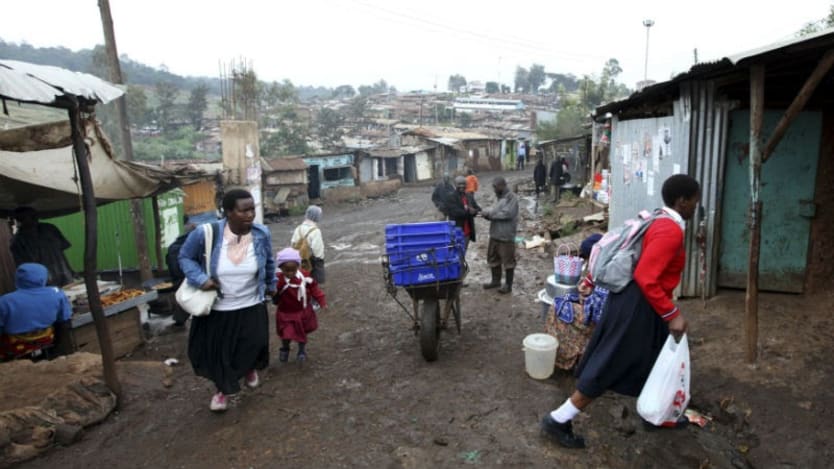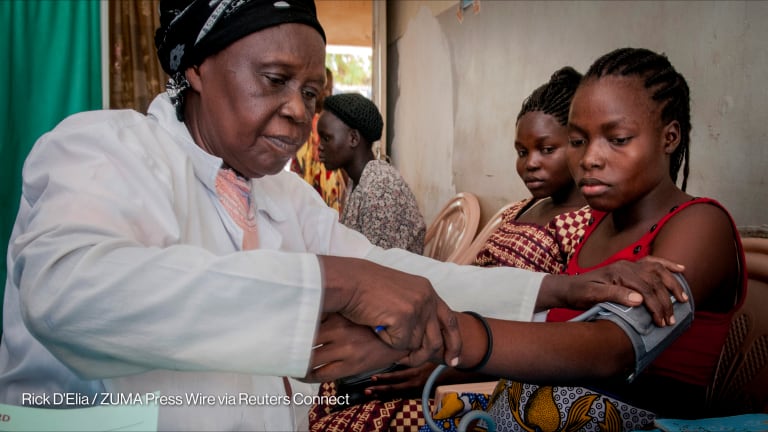
SAN FRANCISCO — Many working moms in Nairobi’s slums walk through winding alleyways to drop their children off at informal child day cares before work.
For 50 cents to $1 a day, mothers leave their children for 12 to 14 hours at one of the more than 3,000 unlicensed and unregulated centers. Infants sit on the floor in darkness and in silence, either because their cries are never answered or because their caretakers give them alcohol or sleeping pills to keep them quiet, according to entrepreneur Sabrina Habib, describing a scene she first witnessed eight years ago.
“Child care has largely been ignored by the development world, as people have assumed that families figure out family arrangements to care for their young children.”
— Dana Schmidt, senior program officer, Echidna GivingHabib co-founded Kidogo, a social enterprise focused on providing high-quality child care that meets the needs of both mothers and children in East Africa’s low-income communities. She and her team map existing day cares, recruit and train the caretakers, and connect them with a community of practice where they benefit from peer-to-peer learning. Their facilities are then eligible to become Kidogo centers, and the social enterprise offers ongoing support and quality assurance.
Research, policy, and advocacy for early childhood development, or ECD, tends to focus on what is best for young children in their critical early years. But the ECD community does not take into account the unintended impacts of their interventions on family members, including mothers, older siblings, and grandparents. This has led the fields of ECD and women’s economic empowerment to work in silos, or even at odds with one another, rather than taking into account each other’s objectives.
“The gendered nature of child care limits women and girls’ educational attainment, workforce advancement, and opportunities, and full participation in community life,” Amanda Glassman, executive vice president of the Center for Global Development, said at a December event. “Though it’s a well-recognized barrier to gender equality and economic development, there still is little rigorous evidence on what works to reduce this demand on women and girls’ time and how ECD policies and programs can be better designed with women and girls’ time poverty in mind.”
By looking at ECD through a gender lens, researchers, donors, and policymakers are exploring ways to improve outcomes for both children and women, from engaging men in caregiving to improving center-based child care.
Filling gaps in research
Only a third of studies on ECD measure the outcomes on mothers and other family members, according to Pamela Jakiela, senior fellow at CGD.
Even when studies do evaluate impacts on women, the majority of them “only view women as a way of impacting children through their own parenting and not people whose lives matter in their own right,” she said.
For example, home-based parenting programs have proven to be a winning intervention for child development outcomes. But group-based parenting programs also support maternal outcomes, helping mothers feel more supported and less depressed, according to research by Lia Fernald, professor at the University of California, Berkeley. Studies and policies that do not take into account the impacts of child care on women would miss this opportunity to improve the well-being of moms and kids at the same time, she said.
There is a tension between two facts, Kehinde Ajayi, economist at the World Bank, said at CGD’s December event: Around the world, women are more likely than men to engage in child care — which limits their employment opportunities — and children need a nurturing environment to thrive. The key is to identify interventions that both increase female economic activity and stimulate early childhood development, Ajayi said.
In Burkina Faso, UNICEF — which is increasingly advocating for family-friendly policies in workplaces — has donated tents to be used as creches, or day cares. Each of these centers, linked to urban public-works projects, have the capacity to offer 50 kids up to 6 years old nutritious meals, a learning curriculum, and toys, at a cost of $16.65 per child per month, Ajayi said. The World Bank’s Africa Gender Innovation Lab is working with ministers of education and health to evaluate the intervention, testing 18 public-works sites with creches and 18 without in order to assess the impacts on both the children and their mothers.
When groups focused on ECD and women and girls’ agency come together, they can develop a shared agenda to drive policy change that benefits whole families and economies, said Megan O’Donnell, assistant director of the gender program and senior policy analyst at CGD.
Interventions targeting children, such as government-subsidized preschools, can have an impact on their mothers, and interventions targeting mothers, such as mental health care, can have an impact on their children, several researchers at the event said.
In the short term, O’Donnell said she hopes to see more people who are focused on child care in low- and middle-income countries integrate a focus on women and girls into their work; in the long term, she said she hopes to see a community of practice form in order to drive policy change at the intersection of ECD and women’s agency.
Bringing communities together
The William and Flora Hewlett Foundation and Echidna Giving, a private funder based in Silicon Valley that supports girls’ education, joined forces to support the CGD event.
“Child care has largely been ignored by the development world, as people have assumed that families figure out family arrangements to care for their young children,” Dana Schmidt, senior program officer at Echidna Giving, told Devex.
She said the lack of coordination between the ECD and women’s empowerment communities can lead to missed opportunities for mutual benefit — or even cause adverse effects.
For example, if the Lego Foundation and the international development organization BRAC were to extend the hours of their Play Labs in Bangladesh, Uganda, and Tanzania from 3 hours a day to 8 hours a day, the program would support not only child development, but also women’s economic empowerment, making it a win for the broader household, Schmidt said.
Echidna Giving has made several grants to better understand the supply, demand, and policy landscape for child care in Africa.
The group is already supporting Mobile Creches, a group that assists children in construction sites and slums in India, and Schmidt said it is likely to fund others that are developing and running child care models so as to understand what approaches are effective and how governments might ultimately support these models.
While philanthropy can provide the risk capital needed to test new child care models that work for all, government subsidies will be needed to make these models sustainable, and both Echidna Giving and the Hewlett Foundation are interested in seeing that investment.
With support from the Hewlett Foundation, the Growth and Economic Opportunities for Women research program has built up an evidence base on the effects of subsidized child care on women’s economic agency and economic development, which can help guide smart policy.
“Investments in early child care and education, alongside opportunities for women to earn an income, are key levers for many low- and middle-income countries to grow their economies and increase prosperity,” said Althea Anderson, program officer at the Hewlett Foundation.
Moving forward, she said she hopes to see researchers, such as those who presented at the CGD event, engage with policymakers, employers, and early childhood development providers on how best to improve social protection, labor policies and practices, and ECD provision.
While Hewlett and Echidna are supporting work at the intersection of ECD and women’s empowerment, there remains a fairly limited amount of funding available for research and policy work that bridges these two communities, CGD’s Jakiela said.
“Donors often have one group that they’re really focused on — whether it is young children, girls, or women,” she said. “Our hope is that the conference catalyzes more support for work that bridges these different perspectives.”
Search for articles
Most Read
- 1
- 2
- 3
- 4
- 5








